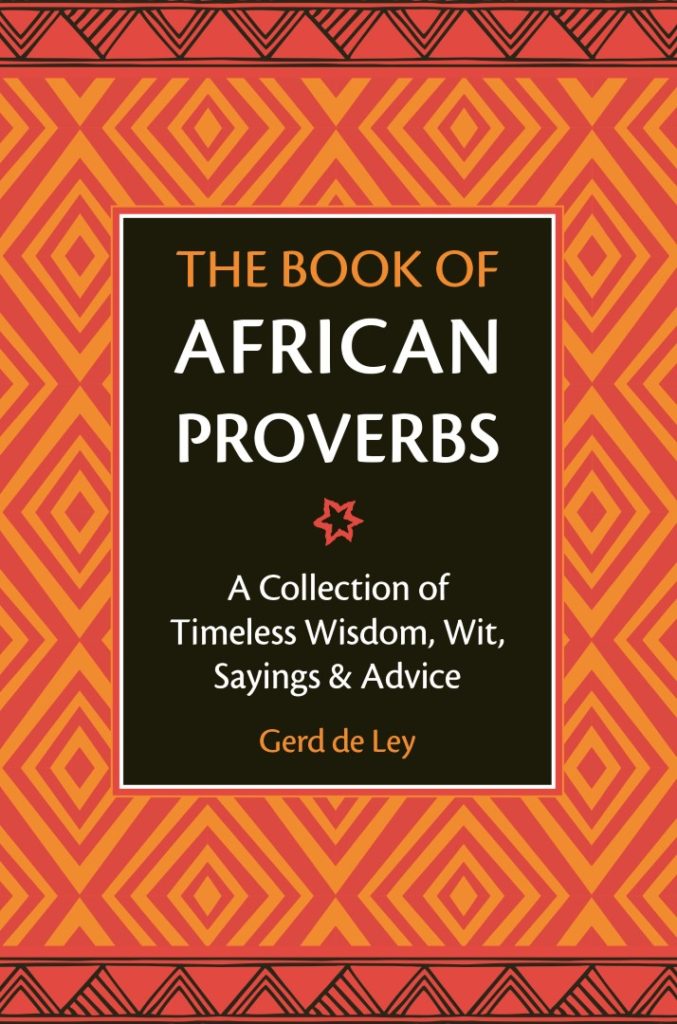Gerd de Ley’s The Book of African Proverbs is an encyclopedic collection of cultural and social insights from across the African continent. The book is divided into nine sections that weave a common thread of overarching themes through hundreds of different proverbs. The author explores the relationship people have to each other, with their own feelings, and to social constructs like justice and lies. Some of the proverbs included define humans’ relationships to domestic and wild animals, and to the natural world. It is an easy book to pick up, read a quote, a few pages, or an entire section, and then spend the day pondering the meaning of the more culturally specific proverbs.
Familiar Wisdom For Those Who Have Lived in Africa
For anyone who has traveled or lived in Africa, the proverbs are vivid reminders of what life is like there. Throughout the book, the reader will find unique insights like:
“In the west they have watches, but we have time.”
“Visitors footfalls are like medicine, they heal the sick.”
“Treat your guests like guests for two days, then on the third day, give him a hoe.”
“An onion shared with friends tastes like roasted lamb.”
“Water is the king of food.”
Cultural Uniqueness and Universal Truths
Some of the proverbs illustrate the uniqueness and differences between the cultures and countries referenced. Others convey universal truths that bind us all together, regardless of culture, geography, or language. A few of those include:
“The heart of a fool is in his mouth and the mouth of a wise man is in his heart.”
“Silence is also speech.”
“When you are rich you are resented, when you are poor you are despised.”
“Happiness requires something to do, something to love and something to hope for.”
“The world has not made a promise to anybody.”
“Advise and counsel him; if he does not listen, let adversity teach him.”
“If you think you are too small to make a difference, try sleeping in a closed room with a mosquito.”
Historical and Cultural Insights
The book imparts historic insights into places that no longer exist like Abyssinia, Rhodesia and Zaire. Some proverbs couldn’t be linked to a culture or country, so are attributed to the continent as a whole. Others are specific to an individual ethnic group. Echoed in some of the sayings are the colonial legacies that have impacted the majority of the continent, while others illustrate the historical influence of European religions. The role color plays in the collective consciousness of Africa comes through in proverbs like: “Black will blacken people.” And, “Even if chickens don’t wash, their eggs are still white.”
The proverbs clearly show the value of, or low regard for specific animals – some that are familiar to us in the West, others that are much more familiar to Africans. Some of the adages remind the reader how differently Africans relate to dogs and cats, as well as the significance of chickens, sheep, camels and elephants in their societies.
The proverbs underscore that in many parts of Africa women are regarded more as property than as people. In fact, several of the proverbs underscore gender-based inequities worldwide. Themes of fear, hatred, fairness and honesty are all explored through many different cultural lenses. Some of the proverbs explore universal truths about friendship, in-laws, work and thieves.
The Book of African Proverbs as a Perfect Conversation Starter
With over 1,200 collected sayings, the book is a great gift book, and also is fun to read aloud with family and friends and then discuss everyone’s interpretations of the more ambiguous proverbs. One such proverb left ripe for conversation is: “Better the gurgling of a camel than the prayers of a fish.”

For More:
- The Book of African Proverbs, by Gerd de Ley, Published by Hatherleigh Press, and distributed through Penguin Random House. www.hatherleighpress.com.
- On our site: The Art of Moroccan Ceramic and Tile Work
-Book cover courtesy of Hatherleigh Press.


